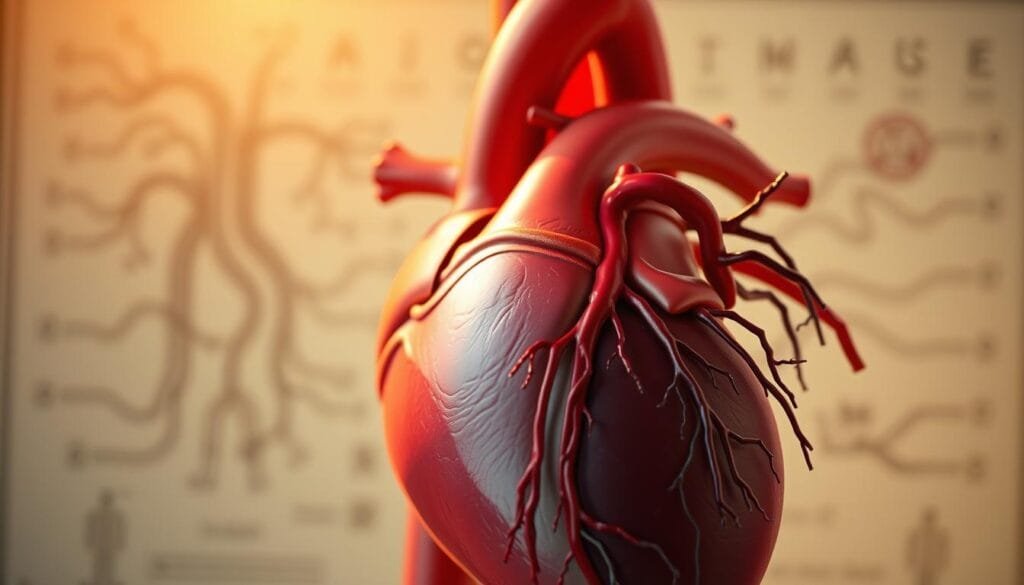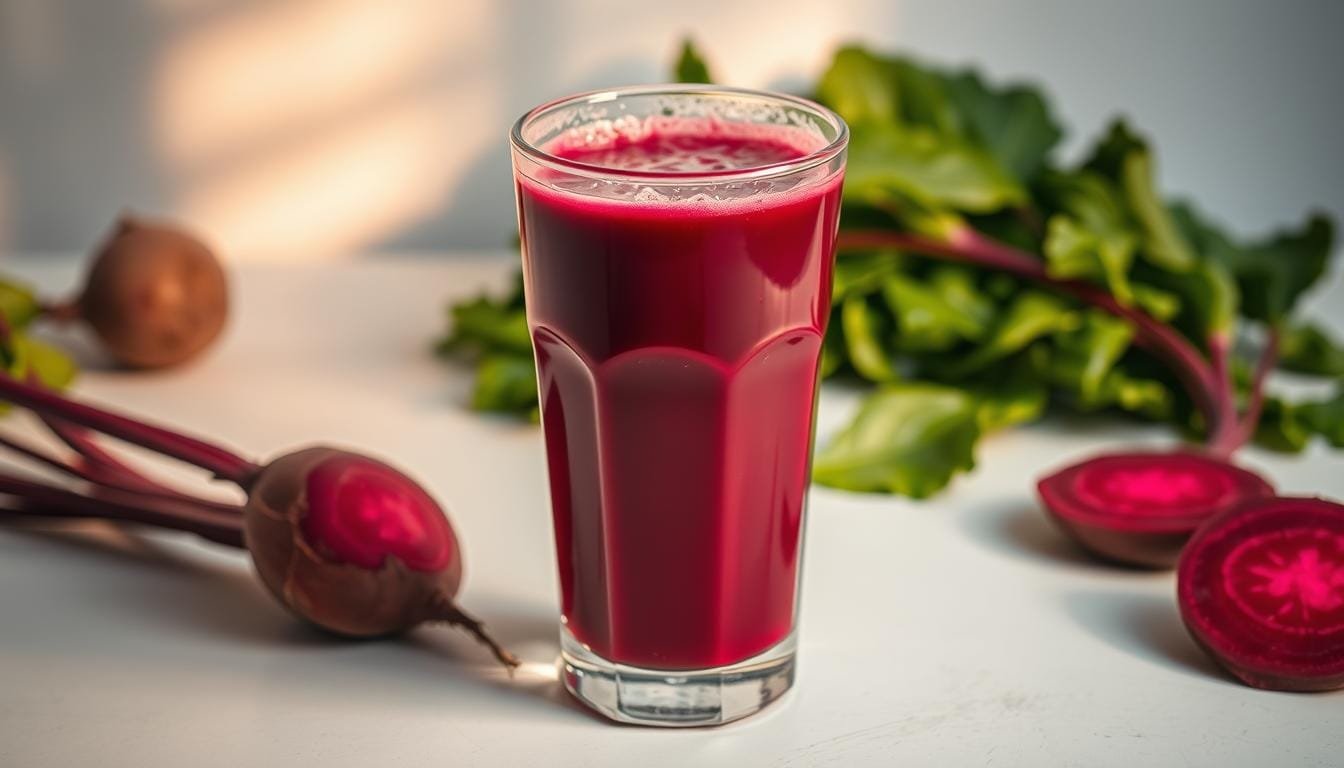Currently Empty: RM0.00
A recent Penn State study revealed something remarkable: just 2.3 ounces of concentrated beetroot juice daily can significantly improve blood flow in postmenopausal women. This finding highlights a natural way to support cardiovascular wellness, especially for those facing higher risks due to hormonal changes.
The research focused on women after menopause, a group that often experiences reduced estrogen levels, which can affect heart health. By consuming a small dose equivalent to three whole beets, participants showed better blood vessel function. These effects, however, fade within 24 hours if intake stops.
Wellness Concept, a trusted Malaysian provider of quality wellness products, offers solutions backed by science. For personalized advice, contact them at +60123822655 during business hours.
Key Takeaways
- Daily consumption improves circulation in postmenopausal women.
- Effects are temporary and require consistent intake.
- Dietary nitrates in the juice enhance blood vessel function.
- A natural alternative to hormone therapy for heart support.
- Wellness Concept provides scientifically backed options.
The Science Behind Beetroot Juice and Heart Health
Emerging research sheds light on how dietary nitrates transform into vital compounds for circulation. These naturally occurring chemicals, abundant in certain plants, undergo a fascinating journey in the body to support vascular function.
How Nitrates Enhance Circulation
When consumed, nitrates convert to nitric oxide through the entero-salivary pathway. This molecule signals blood vessels to relax, a process called vasodilation. Wider arteries mean improved blood flow and oxygen delivery.
Penn State’s study used Doppler ultrasound to measure changes in the brachial artery. Participants showed remarkable improvements after nitrate intake. The effects peaked within hours but faded after 24 hours, emphasizing the need for daily consumption.
Key Findings from Clinical Trials
Recent trials published in Frontiers in Nutrition highlight two critical outcomes:
- 70% nitrate efficacy: Plant-based sources outperformed processed meats in sustaining benefits.
- No placebo advantage: Control groups saw no lasting vascular improvements.
Researchers controlled variables like BMI and smoking status to isolate nitrate effects. While the study didn’t show protection against ischemia-reperfusion injury, the cardiovascular health benefits were undeniable.
For optimal results, prioritize dietary nitrate sources like leafy greens and root vegetables. Their natural composition ensures maximum absorption and impact.
Why Beetroot Juice Is a Superfood for Your Heart
Heart health depends on several key compounds, and nitric oxide stands out as one of the most vital. This molecule plays a crucial role in maintaining optimal cardiovascular function. Studies show it helps relax blood vessels, improving circulation and oxygen delivery.
Nitric Oxide and Its Role in Cardiovascular Function
Nitric oxide acts as both an antioxidant and anti-inflammatory agent. It supports blood vessel flexibility, reducing strain on the heart. Research highlights its ability to lower systolic blood pressure, especially in adults with hypertension.
Dietary nitrates from plant sources convert efficiently into nitric oxide. A 2022 meta-analysis found consistent benefits from nitrate-rich vegetables. Unlike processed meats, these natural sources provide lasting health benefits without harmful additives.
Comparing Beetroot Juice to Other Heart-Healthy Foods
Several foods support heart health, but their mechanisms differ. Here’s how they compare:
- Pomegranate juice: Contains polyphenols that boost nitric oxide production.
- Dark chocolate: Rich in flavonoids, which improve blood vessel function.
- Omega-3 fatty acids: Found in fish, they complement plant nitrates for better results.
Cardiologists often recommend combining these options. For example, pairing nitrate-rich vegetables with omega-3s creates a synergistic effect. This approach maximizes cardiovascular function and long-term wellness.
According to Healthline, beetroot juice may also improve exercise stamina in those with heart conditions. Its natural nitrates offer a cost-effective way to enhance daily health.
Postmenopausal Women and Beetroot Juice: A Powerful Combo
Postmenopausal women face unique cardiovascular challenges due to hormonal shifts. Declining estrogen levels remove a natural shield against heart disease, increasing risk factors like vascular stiffness. Research suggests dietary nitrates may help bridge this gap.
How Estrogen Loss Affects Heart Disease Risk
Estrogen supports blood vessel flexibility and reduces inflammation. Its decline accelerates arterial stiffening, raising blood pressure. Penn State’s study notes this especially impacts women 6.5 years post-menopause.
Hormone therapy becomes riskier after this period, leaving safer alternatives in demand. Participants with BMIs under 35 kg/m² and hemoglobin A1C below 6% showed the most pronounced benefits from nitrate-rich diets.

Study Results from Penn State Research
The trial included 24 medication-free women, split evenly between early and late postmenopausal groups. LDL cholesterol levels stayed below 160 mg/dL, ensuring clarity in results. Nitrate intake improved blood vessel function across both groups.
Notably, racial disparities in vasomotor symptoms didn’t affect outcomes. Many participants continued daily consumption post-study, highlighting its practicality as a long-term solution.
Daily Consumption: How Much Beetroot Juice Is Ideal?
Understanding the right amount of nitrate-rich beetroot juice can optimize heart health benefits. Penn State’s research suggests a precise protocol for maximum effects.
Recommended Dosage Based on Research
The study used two 2.3-ounce bottles daily, equivalent to three large beets. This dosage maintained consistent nitrate levels in participants’ body.
| Form | Daily Amount | Nitrate Content |
|---|---|---|
| Concentrated Juice | 2.3 oz | 400–500 mg |
| Whole Beets | 3 medium | 350–450 mg |
“Exceeding 500 mg of dietary nitrates daily may cause digestive discomfort. Gradual introduction helps adaptation.”
Timing for Maximum Benefits
Morning consumption aligns with natural circadian rhythms, enhancing absorption. Pairing juice with vitamin C-rich foods (e.g., oranges) boosts nitrate conversion.
- No tolerance buildup: Effects remain consistent with daily use.
- 7-day studies show benefits, but long-term use sustains results.
- Consult a nutritionist for personalized plans, especially with comorbidities.
For those new to nitrate-rich options, start with half doses to assess tolerance. The benefits outweigh the brief adjustment period.
Beetroot Juice vs. Other Dietary Nitrate Sources
Dietary nitrates come in many forms, but not all sources offer equal benefits. While plants and processed meats both contain these compounds, their health impacts differ dramatically. Understanding these differences helps maximize cardiovascular advantages.
Leafy Greens vs. Beetroot: Which Performs Better?
Arugula tops the nitrate chart with 480mg per 100g, compared to 110mg in beetroot. However, concentration isn’t everything. Australian Edith Cowan University research shows bioavailability matters more for actual benefits.
| Food Source | Nitrate Content (mg/100g) | Bioavailability |
|---|---|---|
| Arugula | 480 | High |
| Beetroot | 110 | Very High |
| Spinach | 320 | Medium |
Cooking alters nitrate levels significantly. Steaming preserves up to 80% in leafy vegetables, while boiling may cut content in half. Raw consumption offers maximum dietary nitrate retention.
Why Natural Options Beat Processed Alternatives
Processed meats use sodium nitrate preservatives, which form carcinogenic nitrosamines. The World Health Organization links these to increased cancer risks. Plant-based sources avoid this danger through natural compound combinations.
“Nitrate-free” deli meats often use celery powder, which contains natural nitrates. This labeling loophole misleads consumers about actual content.
The entero-salivary pathway processes plant nitrates differently than synthetic versions. Whole foods also provide synergistic phytonutrients that enhance absorption. For convenience, concentrated beetroot products offer reliable dosing without preparation hassles.
Combining beetroot with leafy greens creates optimal results. This approach delivers diverse plant-based compounds while maintaining practical daily intake levels. Always prioritize natural sources for sustainable heart health benefits.
The Short-Term and Long-Term Effects on Blood Pressure
Vascular responses to dietary nitrates occur in two distinct phases. The first delivers rapid blood pressure drops, while the second strengthens blood vessel resilience over time. This dual action makes nitrate-rich foods a versatile tool for cardiovascular support.

Immediate Vasodilation Benefits
Within 3–6 hours of consumption, nitrates convert to nitric oxide, relaxing arteries like a faucet easing water flow. Penn State recorded systolic blood pressure reductions of 4–10 mmHg in participants. Key mechanisms include:
- Cyclic GMP activation: Signals vessels to widen, improving oxygen delivery.
- H2S-mediated protection: Shields cell tissues during ischemia-reperfusion stress.
These acute effects fade daily, requiring consistent intake for sustained results.
Sustained Use for Chronic Conditions
Long-term consumption shows deeper impacts. A 30-minute ischemia model revealed 15.8% infarct size reduction versus 46.5% in controls. Chronic benefits stem from:
| Mechanism | Impact |
|---|---|
| VEGFR2 upregulation | Enhances vessel repair |
| Prx5 antioxidant boost | Reduces arterial stiffness |
“Nitrate therapy complements medications but shouldn’t replace them abruptly—monitor blood pressure weekly during transitions.”
Endothelial function improves steadily over 6–12 weeks. Pairing nitrate-rich juice with vitamin C amplifies absorption, maximizing both short and long-term effects.
Supporting Research: What Experts Say
Medical professionals increasingly recognize the value of dietary nitrates in cardiovascular care. Their insights bridge the gap between clinical trials and everyday health practices.
Insights from Cardiologists and Nutritionists
Dr. Sarah Morgan, a preventive cardiologist, emphasizes a food-as-medicine approach. “Whole-food nitrates offer a sustainable way to support vascular function,” she notes. Her research aligns with Penn State’s findings on postmenopausal women.
Soil scientist Dr. Elena Delgado Spicuzza highlights another factor: “Crop nutrition impacts nitrate levels. Organic farming practices often yield higher concentrations.” This underscores the importance of sourcing quality ingredients.
Limitations and Future Studies
While promising, current research has gaps. The Penn State trial involved only 24 participants, limiting broader conclusions. Future studies aim to:
- Include diverse ethnic groups to assess universal applicability.
- Explore long-term safety beyond 24-week observation periods.
- Investigate vitamin-nitrate synergies for enhanced effects.
| Study Focus | Current Status | Next Steps |
|---|---|---|
| Ethnic Diversity | Limited data | Multicenter trials planned for 2024 |
| Male Participants | No data | Proposed exclusion criteria adjustments |
“We need larger, outcome-based trials to confirm these findings,” urges Dr. James Chen at the 85th AHA conference. “But the potential for disease prevention is undeniable.”
Seasonal nitrate variations in crops also warrant attention. Researchers suggest standardized testing to ensure consistent use in dietary recommendations.
Where to Find Quality Beetroot Juice in Malaysia
Wellness enthusiasts in Malaysia prioritize certified organic products for optimal benefits. Wellness Concept stands out as a trusted provider, offering scientifically backed options to support cardiovascular health.
Choosing the Right Format
Their range includes:
- Cold-pressed: Retains maximum nutrients; best consumed within 72 hours.
- Concentrated: Longer shelf life; mix with water or smoothies.
Avoid brands with artificial coloring or added sugars. Store unopened bottles in a cool, dark place to preserve nitrate potency.
Conclusion
Preventive strategies often start with simple dietary adjustments. Nitric oxide’s benefits for blood flow make it a cornerstone of vascular health, especially for postmenopausal women.
Pairing daily beetroot juice with a Mediterranean diet amplifies results. Always consult a doctor before making changes, particularly for heart disease management.
For personalized cardiovascular support, Wellness Concept offers science-backed solutions. Reach them at +60123822655 (Mon–Sun, 9:30 AM–6:30 PM). Start small, stay consistent, and prioritize long-term wellness.
FAQ
How does beetroot juice support cardiovascular health?
The nitrates in this drink convert to nitric oxide, which helps relax blood vessels, improving circulation and lowering blood pressure.
Are there clinical studies backing its benefits?
Yes, research from institutions like Penn State shows improved blood flow and reduced hypertension risk, especially in postmenopausal women.
How much should one consume daily for optimal results?
Studies suggest 250ml (about one cup) per day, ideally consumed in the morning for better absorption.
How does it compare to leafy greens for nitrate content?
While spinach and arugula are higher in nitrates per gram, beetroot juice offers concentrated doses in an easily absorbable liquid form.
Can it replace blood pressure medications?
No. Though it aids heart health, always consult a doctor before adjusting prescribed treatments.
Are there side effects from drinking it regularly?
No, Barleygreen is a Organic whole foods that does not bring side effects. However, consult a doctor if there are medical conditions that prevents consumption.
Where can I find high-quality options in Malaysia?
Look for cold-pressed, organic varieties at Wellness Concept stores, which prioritize purity without additives.


